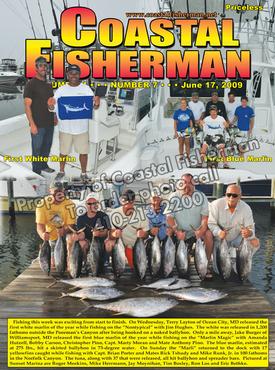


Article by Sam Kilgore
 When first learning the basics of surf fishing, new anglers are required to learn quite a bit of information. They need to find out what species of fish are commonly found in the surf during that time of the year. With guidance from an experienced angler or a friendly tackle shop they can choose the correct rod, reel and terminal tackle needed. Once they have been taught how to safely control their casts, properly bait hooks and correctly tie fishing knots, they will most likely catch a fish. Now that the basics of surf fishing are understood, this angler feels confident enough to go out and put in the necessary time. Unfortunately, understanding the importance of when to fish is often neglected. There are rarely any certainties when it comes to catching fish but we do have an understanding of how weather conditions can be beneficial and sometimes detrimental.
When first learning the basics of surf fishing, new anglers are required to learn quite a bit of information. They need to find out what species of fish are commonly found in the surf during that time of the year. With guidance from an experienced angler or a friendly tackle shop they can choose the correct rod, reel and terminal tackle needed. Once they have been taught how to safely control their casts, properly bait hooks and correctly tie fishing knots, they will most likely catch a fish. Now that the basics of surf fishing are understood, this angler feels confident enough to go out and put in the necessary time. Unfortunately, understanding the importance of when to fish is often neglected. There are rarely any certainties when it comes to catching fish but we do have an understanding of how weather conditions can be beneficial and sometimes detrimental.
An onshore wind (an easterly wind blowing off the ocean) will blow the ocean’s clean, clear surface water towards the shore. This surface water has been heated by the sun, and depending on the wind’s duration, can travel many miles bringing with it a variety of sea life.
A strong onshore wind can increase the size of waves and make the inshore breakers more turbulent. These strong waves crash hard on the sand, churning up the seabed and exposing bait such as small fish, calico crabs and sand fleas. Of course, where there is bait, you often find larger fish.
An offshore wind (west wind blowing from the shore) blows against the incoming waves. Depending on the speed and duration, this wind can significantly decrease the size of the waves, making it difficult to read the water. If the offshore wind is strong enough, it can blow the loose, dry sand into the surf giving the water a brownish tint which reduces the water clarity. Have you ever gone to the beach on a hot day during the summer and found the water much cooler than you had expected? Believe it or not, this can also be caused by a warm wind blowing from the land. This dry wind blows across the ocean surface pushing the clean, clear surface layer of water further out to sea. As a result, cooler water rises from the ocean floor pulling up sediment, seaweed, shell fragments and many other tiny particles of debris. When fishing during these conditions, frequently check your line for abrasions caused by this floating debris.
A consistent, light wind will help calm the water and increase the clarity. If there is a sudden change in wind due to an approaching storm or an offshore swell, the previously calm water will suddenly become turbulent. The bait fish become confused and are easy prey for the larger predatory fish. If the conditions continue to worsen, strong winds and ripping current can turn your feeding frenzy into an unfishable situation. Serious storms can sneak up on you very fast when you are near the water and holding a fishing rod when lightning strikes is not worth any fish. If the wind is blowing 25 mph or more, you are probably going to find it difficult to keep the sand out of your eyes and your bait from drifting down the beach.
Checking the weather conditions frequently, for at least 24 hours prior to your surf fishing trip, will allow you to be better prepared. A great place to find both past and up-to-date ocean information is at The National Oceanic and Atmospheric Administration website, www.noaa.org.
Check out the tide charts and allow yourself some time at low tide to scout the beach. Keep in mind, the moon causes the tide to change and during the full moon and new moon, you will see a higher tide than normal. Combine an incoming tide with strong wind and you could find yourself fishing in deep water. Check out the latest fishing reports online. Not only can you find out if the fish are biting, but other anglers can provide valuable information regarding the recent beach conditions. Call our local tackle shops for additional help and advice. They can be a great source of current information and you can also find out who has the freshest bait.
Sam Kilgore is an avid surf fisherman and administers AtlanticAnglers.com, a free, family friendly website devoted to helping anglers learn all aspects of fishing.